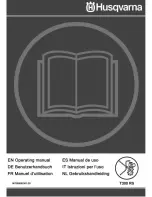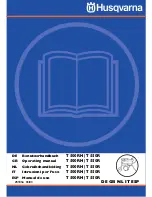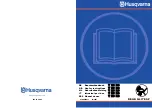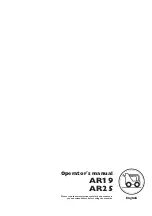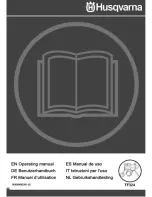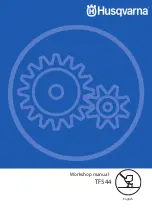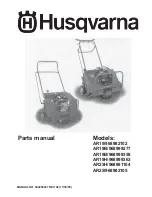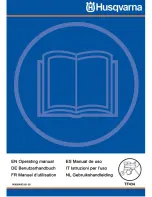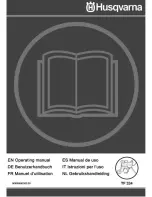
CONTENTS
4
English Page
4
Español página
28
CONTENTS
SYMBOLS USED
I
SECTION I: USER
5
I.1
Versions available ....................................................................................................... 5
I.2
Machine identification ................................................................................................. 5
I.3
Intended conditions of use ......................................................................................... 5
I.4
Operating limits ........................................................................................................... 6
I.5
Warnings regarding potentially toxic substances .................................................... 7
I.6
Residual risks and hazards that cannot be eliminated ............................................ 8
I.7
PED Categories of Pressure Components ................................................................ 8
I.8
Description of commands and controls .................................................................... 8
I.8.1
Main disconnection switch ...................................................................................... 8
I.8.2
High and low pressure switches. ............................................................................. 8
I.8.3
High and low pressure gauges (GM accessory) High pressure gauge: indicates the
high pressure value. ................................................................................................ 8
II
SECTION II: Installation and maintenance
9
II.1
Construction features ................................................................................................. 9
II.1.1
Available set-ups .................................................................................................... 9
II.1.2
Electrical panel ....................................................................................................... 9
II.2
Accessories ............................................................................................................... 10
II.2.1
Factory fitted accessories ..................................................................................... 10
II.2.2
Accessories supplied separately ........................................................................... 10
II.3
Transport - Handling - Storage ................................................................................. 11
II.4
Installation ................................................................................................................. 11
II.4.1
Installation site requirements ................................................................................ 11
II.4.2
Indoor installation .................................................................................................. 11
II.4.3
Clearances and positioning ................................................................................... 11
II.4.4
Reduction of the unit's sound level ........................................................................ 12
II.5
Electrical connections .............................................................................................. 13
II.6
Hydraulic connections .............................................................................................. 14
II.6.1
Connection to the system ..................................................................................... 14
II.6.2
Water data ............................................................................................................ 15
II.6.3
Protection against corrosion ................................................................................. 15
II.6.4
Protecting the unit from freezing ........................................................................... 15
II.6.5
Heat recovery system ........................................................................................... 16
II.6.6
Installation suggestions......................................................................................... 17
II.7
Start-up Procedure .................................................................................................... 18
II.7.2
General conditions of the unit ............................................................................... 19
II.8
Instructions for fine tuning and adjustments .......................................................... 22
II.8.1
Calibration of safety and control devices .............................................................. 22
II.8.2
Operation of components ...................................................................................... 22
II.9
Maintenance .............................................................................................................. 23
II.9.1
Routine maintenance ............................................................................................ 23
II.9.2
Special Maintenance ............................................................................................ 24
II.9.3
Repairing and replacing components .................................................................... 25
II.10
Dismantling the unit .................................................................................................. 25
II.11
Schematic troubleshooting ...................................................................................... 26
ATTACHMENTS
A1
Technical data… ................................................................................................ 52
A2
Dimensions and
clearance… ............................................................................. 60
REFERENCE STANDARDS
UNI EN ISO 12100
Safety of machinery - General principles of design - Risk assessment
and risk reduction.
UNI EN ISO 13857
Safety of machinery - Safety distances to prevent hazard zones
being reached by upper and lower limbs.
UNI EN 563
Safety of machinery. Temperature of contact surfaces. Ergonomic
data to establish limit values for temperatures of hot surfaces.
UNI EN 1050
Safety of machinery. Principles of risk assessment.
UNI 10893
Product technical documentation. User instructions
EN 13133
Brazing. Brazer approval
EN 12797
Brazing. Destructive tests of brazed joints.
EN 378-1
Refrigeration systems and heat pumps
– safety and environmental
requirements. Basic requirements, definitions, classification and
selection criteria
EN 378-2
Refrigeration systems and heat pumps
– safety and environmental
requirements. Design, construction, testing, installing, marking and
documentation
IEC EN 60204-1
Safety of machinery. Electrical equipment of machines. Part 1:
General requirements
UNI EN ISO 9614
Determination of sound power levels of noise sources using sound
intensity.
EN 50081-1:1992
Electromagnetic compatibility - Generic emission standard Part 1:
Residential, commercial and light industry
EN 61000
Electromagnetic compatibility (EMC)
SYMBOL
MEANING
DANGER!
The DANGER sign warns the operator and
maintenance personnel about risks that may cause
death, physical injury, or immediate or latent
illnesses of any kind.
DANGER: LIVE COMPONENTS!
The DANGER: LIVE COMPONENTS sign warns the
operator and maintenance personnel about risks
due to the presence of live voltage.
DANGER: SHARP EDGES!
The DANGER: SHARP EDGES sign warns the
operator and maintenance personnel about the
presence of potentially dangerous sharp edges.
DANGER: HOT SURFACES!
The DANGER: HOT SURFACES sign warns the
operator and maintenance personnel about the
presence of potentially dangerous hot surfaces.
DANGER: MOVING COMPONENTS!
The DANGER: MOVING PARTS sign is used to
inform the operator and maintenance personnel of
hazards posed by the presence of moving parts.
IMPORTANT WARNING!
The IMPORTANT WARNING sign indicates actions
or hazards that could damage the unit or its
equipment.
ENVIRONMENTAL PROTECTION!
The environmental protection sign provides
instructions on how to use the machine in an
environmentally friendly manner.
Summary of Contents for EQU-PF 2100
Page 60: ...NOTE...



























